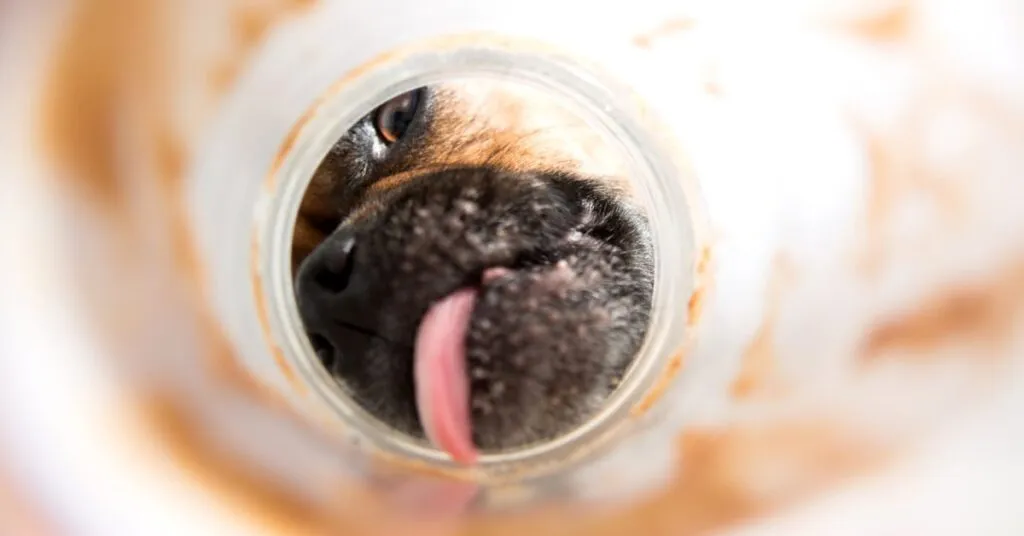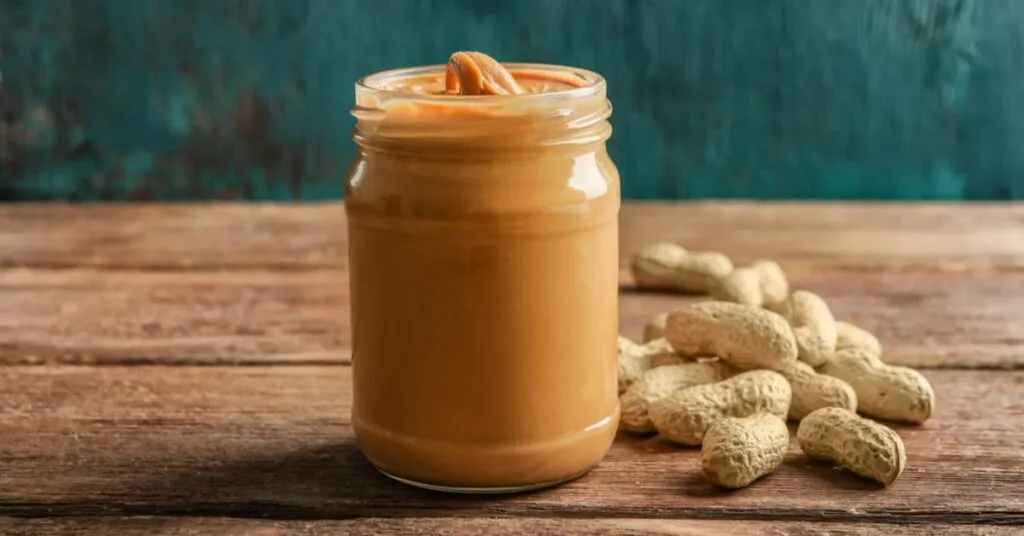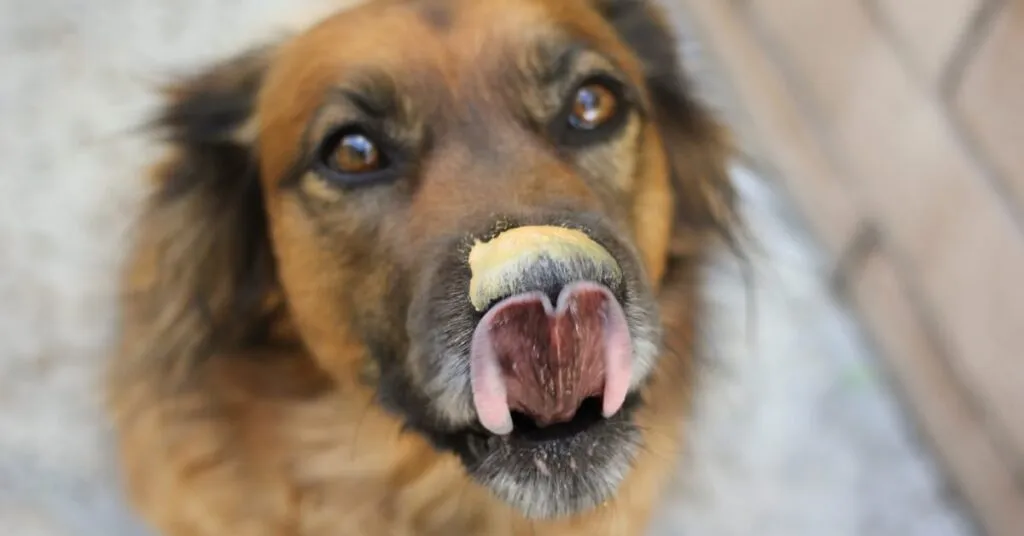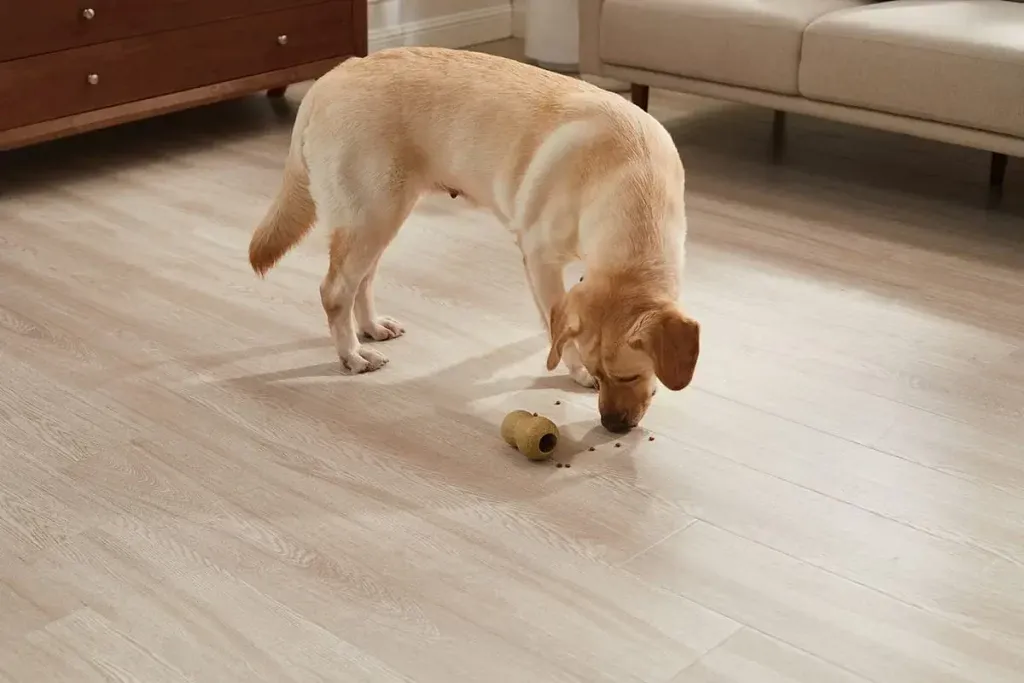As devoted dog owners, we often seek ways to treat our furry companions with their favorite snacks. Peanut butter, with its irresistible aroma and creamy texture, is a popular choice for many. It’s a go-to for stuffing Kong toys, concealing medication, and spreading on lick mats. However, the question of whether all peanut butter varieties are safe for canine consumption is crucial. This guide delves into the specifics of Skippy Peanut Butter Safe For Dogs, exploring what makes certain peanut butters a risky choice and highlighting safer alternatives for your beloved pets.
Understanding What Makes Peanut Butter Dog-Safe
The key to selecting dog-safe peanut butter lies in scrutinizing the ingredient list. The ideal peanut butter for your dog should be simple, with minimal ingredients.
The Importance of Natural Ingredients
Opt for natural peanut butter brands that contain no added sugar or artificial sweeteners. Your primary concern should be avoiding ingredients like xylitol, which is often disguised as “birch sugar.” Always check the label for “no added salt” or “unsalted” options. Preservatives, hydrogenated vegetable oils, and added sugars are also ingredients best avoided when sharing with your canine friend.
Essentially, dog-safe peanut butter should ideally have no more than two ingredients: peanuts and salt. This simplicity ensures that you are providing a treat that is as pure and beneficial as possible.
 Natural peanut butter ingredients for dogs
Natural peanut butter ingredients for dogs
The Dangers of Xylitol and Birch Sugar
Xylitol, a common sugar substitute found in sugar-free gums, candies, and baked goods, poses a significant threat to dogs. If your dog ingests food containing xylitol, it can lead to severe health consequences, including:
- Hypoglycemia: A rapid drop in blood sugar levels.
- Seizures: Uncontrolled electrical disturbances in the brain.
- Liver Failure: Damage to the liver, impairing its vital functions.
- Death: In severe cases, xylitol poisoning can be fatal.
It is imperative to be vigilant and check all labels for xylitol or birch sugar. If you suspect your dog has consumed xylitol, seek immediate veterinary attention. The rapid absorption rate of xylitol makes prompt treatment essential.
Examining Popular Peanut Butter Brands: Is Skippy Safe?
When it comes to popular brands like Skippy, it’s essential to understand their ingredient profiles. While Skippy offers varieties that are xylitol-free, many of their products are not recommended for dogs.
Why Skippy Peanut Butter is Generally Not Advised
Skippy peanut butter, including its “Natural” varieties, often contains ingredients such as corn syrup and trans fats. These additives, while not as acutely toxic as xylitol, can still contribute to long-term health issues in dogs, including obesity and digestive problems. The “natural” label can sometimes be misleading, as it doesn’t always guarantee the absence of unhealthy additives.
Other common grocery store peanut butter brands that pet owners should avoid sharing with their dogs include:
- Peter Pan brand PB
- Jif peanut butter
- Nuts ‘n More
- Krush Nutrition
- Go Nuts Co
- Amazon brand/Happy Belly PB
Even peanut butter products specifically marketed for pets are not always ideal. Brands like Kong Real Peanut Butter have been noted to contain sugar and hydrogenated vegetable oil, while DogButter contains palm oil.
 Common peanut butter brands to avoid for dogs
Common peanut butter brands to avoid for dogs
Safer Peanut Butter Choices for Your Canine Friend
Fortunately, there are several excellent and safe peanut butter options for your dog. These brands prioritize natural ingredients and avoid harmful additives.
Top Recommended Dog-Safe Peanut Butter Brands
Research and expert recommendations highlight the following brands as safe and healthy choices:
- Whole Foods 365 Everyday Value Organic Peanut Butter: This brand is often praised for its single-ingredient simplicity – just peanuts! It’s a pure, natural option without any added salt, sugar, or artificial additives.
- Trader Joe’s Peanut Butter (No Salt): Similar to the Whole Foods option, Trader Joe’s no-salt peanut butter offers a straightforward ingredient list, making it a safe and budget-friendly choice.
- Teddie Super Chunky Peanut Butter: For dogs who enjoy a bit of texture, Teddie Super Chunky peanut butter is a highly recommended option that is also suitable for human consumption.
- Poochie Dog Peanut Butter: This brand is specifically formulated for dogs and includes health-boosting ingredients like turmeric, flaxseed, parsley, and ginger. A portion of their profits also goes towards supporting animal shelters.
For a more extensive list of tested and approved peanut butter treats for dogs, resources like DogLab.com can provide comprehensive reviews and recommendations.
 Dog enjoying peanut butter in a treat toy
Dog enjoying peanut butter in a treat toy
Moderation is Key: The Risks of Excessive Peanut Butter
While peanut butter can be a healthy treat, it’s crucial to administer it in moderation. Even safe peanut butter brands contain a significant amount of healthy fats and calories. Overconsumption can lead to:
- Obesity: Excess calorie intake can result in unhealthy weight gain.
- Pancreatitis: A potentially life-threatening inflammation of the pancreas, often triggered by high-fat diets.
Remember, treats and snacks should constitute no more than 10% of your dog’s overall diet. The majority of their nutritional needs should be met by their regular kibble or a balanced canine diet.
Exploring Alternatives to Peanut Butter for Dogs
Not all dogs enjoy peanut butter, and some may have allergies. Fortunately, a variety of safe and delicious alternatives can be offered to your canine companion.
Nut Butter Alternatives and Other Safe Options
If your dog doesn’t take to peanut butter or if you’re looking for variety, consider these safe nut butter alternatives:
- Almond Butter: A good option for dogs without peanut allergies.
- Sunflower Seed Butter: A nut-free alternative that many dogs enjoy.
- Cashew Butter: Another creamy and palatable option for dogs.
Just like peanut butter, these alternatives are high in fat and should be given in moderation.
Beyond nut butters, several other healthy options can be used for treat stuffing or as occasional snacks:
- Low-fat plain Greek yogurt
- Cream cheese
- Pumpkin puree (ensure it’s plain, not pie filling)
- Green beans
- Watermelon (seeds and rind removed)
- Baby food (ensure it contains no onion or garlic powder)
Nuts to Strictly Avoid
Certain nuts are either unhealthy or outright toxic to dogs and should never be given to them:
- Hazelnuts
- Macadamia nuts
- Pecans
- Walnuts
- Pistachios
Engaging Your Dog with Treat-Dispensing Toys
Treat-dispensing toys are an excellent way to provide mental stimulation and enrichment for your dog, using safe treats like peanut butter or its alternatives.
 Various treat dispensing dog toys
Various treat dispensing dog toys
Recommended Treat-Dispensing Toys:
Orbee-Tuff Guru Treat-Dispensing Puzzle Dog Toy: This durable toy features multiple openings to hide treats, encouraging problem-solving and extended playtime.
Dog Tornado Interactive Treat Puzzle Dog Toy, Blue: A level 2 puzzle toy with tiers and compartments designed to challenge your dog and keep them engaged.
Dog Smart Interactive Treat Puzzle Dog Toy, Orange: A level 1 puzzle toy that’s great for introducing dogs to interactive games, featuring treat compartments hidden under bone-shaped covers.
By choosing safe ingredients and offering them responsibly, you can ensure that treat time is a positive and healthy experience for your dog. Always prioritize natural, simple ingredients and consult with your veterinarian if you have any concerns about your dog’s diet or specific treat choices.
